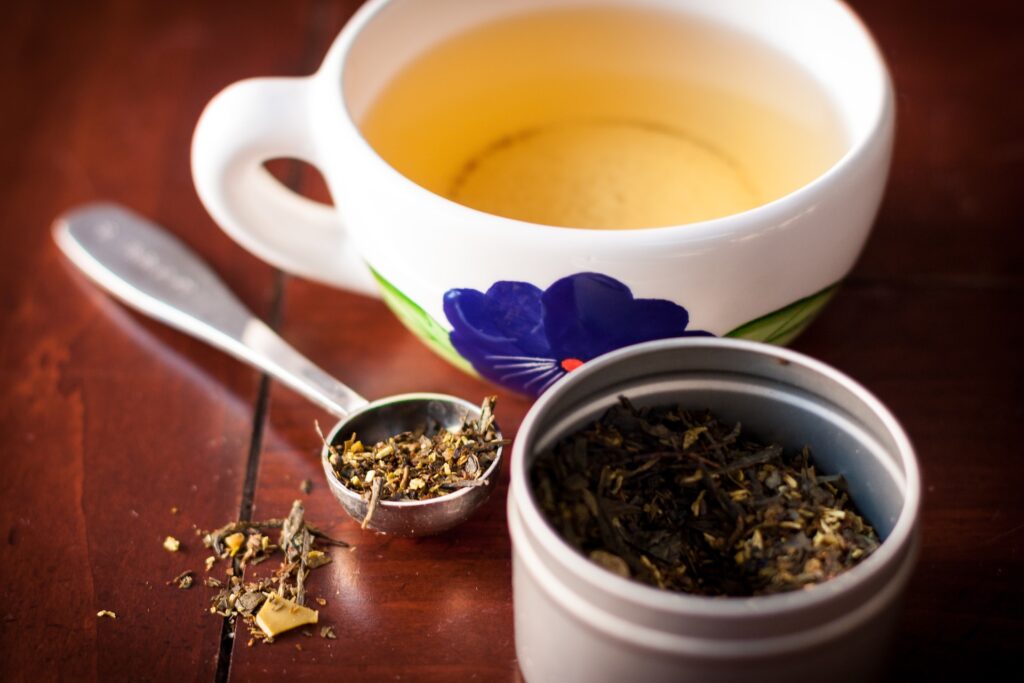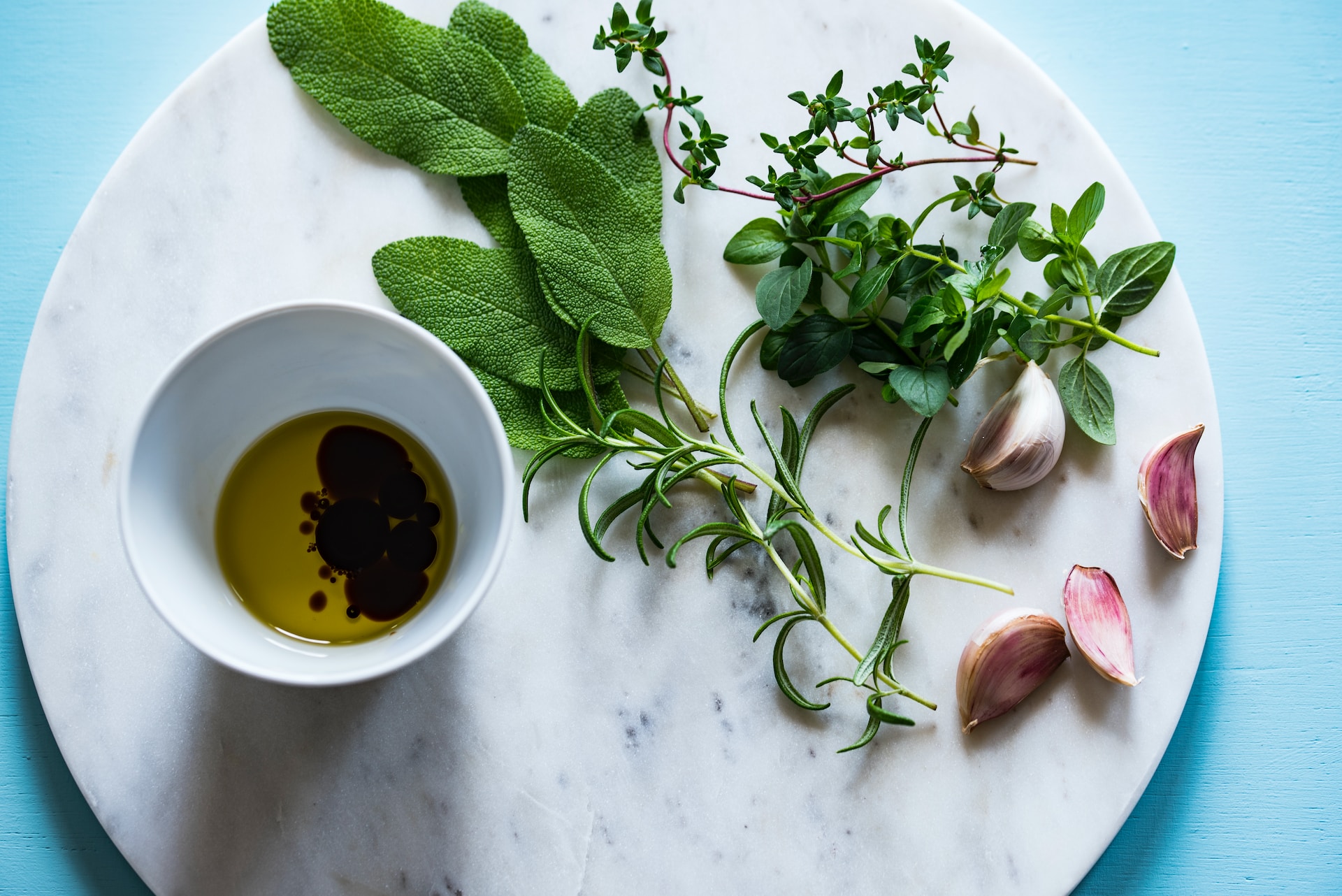Do you want to know which herbs are good for the heart? Cardiovascular diseases are the leading cause of death, so it pays to care for your heart health. Eating a healthy and balanced diet is one important way to protect your cardiovascular system. But did you know that adding certain herbs may also be beneficial?
This blog post will discuss several heart-friendly herbs you can add to your cooking repertoire. As well as any precautions you should consider when using them, you can enjoy the potential health benefits of herbs for your heart.
An Overview of Herbs

Herbs are plants or parts of plants that are used for their medicinal properties. They’re packed with vitamins, minerals, antioxidants, enzymes, and other compounds contribute to their healing powers. Herbal remedies have been used as natural medicines for centuries in traditional cultures worldwide.
Herbs come in two main forms – fresh or dried. Fresh herbs are generally used to make teas, while dried herbs are often brewed into tinctures or used as a culinary ingredient. Many people use herbs for preventive care and treatment of specific health issues.
The Benefits Of Herbs for Heart Health
Research shows that herbs, without any side effects, can be used as a natural remedy to prevent cardiovascular diseases. Here are five ways that herbs can support a healthier heart.
🌿Reduce Cholesterol Levels
High cholesterol levels can lead to serious cardiovascular issues such as coronary artery disease. The best herbs can help reduce these levels by lowering the amount of low-density lipoprotein (LDL) or bad cholesterol in the body. The antioxidant properties present in certain herbs can also help remove plaque from arteries, allowing for improved blood circulation and reducing the risk of heart attacks.
🌿Lowering Blood Pressure
High blood pressure strains the heart and increases the risk of strokes and other heart diseases. The active ingredients present in certain herbs can help lower blood pressure levels and reduce stress on the heart. It can keep your cardiovascular system functioning optimally.
🌿Support Arterial Health
Arterial health is essential for the normal functioning of the circulatory system. Certain herbs contain compounds that strengthen arterial walls, making them less prone to rupture or blockages due to plaque buildup. Herbal remedies also protect against blood clot formation, often associated with cardiovascular problems.
🌿Improve Circulation
Herbal remedies can improve circulation by widening arteries and improving coronary blood flow. It helps ensure that oxygen-rich blood is delivered to all body parts, including your heart muscle, which needs oxygenated blood for optimal functioning. Improved circulation also reduces fatigue and tiredness caused by poor delivery of nutrients and oxygen throughout the body.
🌿Improved Immune System Functioning
A healthy immune system is essential for preventing infection-related illnesses and preserving overall health and well-being. Some herbal remedies possess anti-inflammatory properties that help boost immunity and fight off infections before they take hold in your body. It helps keep your immune system strong to do its job efficiently—protecting you from disease and infection while keeping your heart healthy.
As you can see, herbs have many potential benefits for heart health. However, you must consult a doctor or herbal practitioner before using any herbal remedy to ensure the herb is safe for your particular condition.
Which Herbs Are Good for the Heart?

Traditional medicine has used certain herbs to promote a healthy heart for centuries. Let’s explore some of these herbs and learn their cardiovascular benefits.
🍃Hawthorn
Often referred to as a ‘heart tonic’, hawthorn berry is one of the most popular herbs for heart health. It contains several active compounds, including flavonoids and phenolic acids. Which act as powerful antioxidants that protect against oxidative damage caused by free radicals in the body. Studies suggest that hawthorn extracts may lower cholesterol levels and improve blood flow. Not only that, but it may also help relieve chest pain associated with angina.
🍃Green Tea
Green tea has been a staple beverage for centuries and is consumed all across the world. It contains high concentrations of catechins, an antioxidant with anti-inflammatory properties which can reduce inflammation in arteries and improve circulation throughout your body. Studies also indicate that drinking green tea on a regular basis may lower cholesterol levels and protect against stroke or heart attack.
🍃Turmeric
Turmeric, a popular spice used in Indian dishes and traditional Chinese medicine, contains curcumin – an antioxidant that helps avoid the buildup of plaque inside arteries. An accumulation of this plaque can eventually result in poor circulation and greater health issues like cardiovascular disease or stroke. Research has suggested that taking regular curcumin supplements may not only lower cholesterol levels but also improve blood flow throughout the body; making turmeric a beneficial herb for heart health support!
🍃Olive Leaf
Olive leaf extract is a natural remedy that is increasingly popular over the past few years due to its potential benefits for cardiovascular health. It contains oleuropein. An antioxidant found in olives helps prevent plaque buildup on artery walls while reducing inflammation throughout your body. Additionally, studies show olive leaf extract may help keep your blood pressure at a healthy level while improving circulation throughout your body – both key factors for keeping your heart healthy.
🍃Coriander
Coriander is a natural remedy used since ancient times for its medicinal benefits. It is believed to have anti-inflammatory and antioxidant properties to help reduce heart disease risk. Coriander contains omega-3 fatty acids, which can help lower cholesterol levels and reduce the risk of stroke. Additionally, it has anti-diabetic properties, which can help maintain healthy blood sugar levels.
🍃Berberine
Berberine is the natural active component in many plants and herbs, including goldenseal and Oregon grape root. It has been used for centuries in traditional Chinese medicine as a remedy for various ailments. Berberine may benefit heart health due to its ability to reduce bad cholesterol levels, improve blood flow and reduce inflammation. Additionally, berberine effectively reduces blood pressure levels in some individuals.
🍃Chilli Peppers
Chilli peppers contain capsaicin that can help reduce inflammation, lowering cholesterol levels, and improve circulation throughout the body—all of which are important factors for maintaining heart health.
Capsaicin has also been found to increase thermogenesis (the process by which the body burns calories), which can lead to weight loss over time. Additionally, chili peppers contain vitamins A and C and potassium—all essential nutrients for overall good health.
🍃Cayenne
Cayenne pepper is another popular spice that is known to improve circulation throughout the body while reducing inflammation at the same time. Studies show that cayenne pepper can help lower bad cholesterol levels while increasing good cholesterol levels in the body—both of which are essential factors when it comes to maintaining a healthy cardiovascular system.
Furthermore, cayenne pepper contains capsaicin and other compounds such as carotenoids and bioflavonoids—which all have antioxidant properties that can help protect against free radical damage caused by environmental toxins or poor nutrition choices over time.
🍃Dandelion
Dandelion contains vitamins A, C, and K and minerals such as calcium, iron, and potassium. Studies show that dandelions can help reduce cholesterol levels and improve circulation. It also has antioxidant properties which help protect the body from free radical damage. Additionally, dandelion reduces inflammation, which is essential for maintaining a healthy heart.
🍃Bladderwrack
Bladderwrack has been a stalwart of traditional medicine for centuries, boasting various benefits for overall health. In particular, its high iodine content helps normalize thyroid hormones and metabolic rate – an advantage to those who experience high cholesterol or cardiovascular concerns. Even more so, this seaweed is rife with antioxidants that protect the body from oxidative damage while also reducing inflammation.
🍃Grape Seed
Extensive research has been conducted on the potential cardiovascular benefits of grape seed extract. This beneficial supplement can help reduce inflammation, lower cholesterol levels and improve blood flow for a healthier heart. The grape seed extract is also incredibly effective in decreasing oxidative stress on heart tissue over time, resulting in improved overall health.
🍃Prunella Vulgaris
Prunella vulgaris has been a staple in Traditional Chinese Medicine for many centuries, used to successfully manage hypertension and cholesterol levels. Recent studies demonstrate that this botanical can not only reduce inflammation and improve circulation throughout the body but also help you achieve improved cardiovascular health over time. What’s even more remarkable is it does so by decreasing LDL (bad) cholesterol while raising HDL (good) levels in your bloodstream.
🍃Holy Basil Leaf
Holy basil leaf has been traditionally used in Ayurvedic medicine for its anti-inflammatory properties and ability to reduce stress levels and improve overall moods. Recent studies have shown that holy basil leaf may also be beneficial for improving cardiac function by decreasing inflammation throughout the body and improving blood vessel elasticity, leading to better overall circulation throughout the body over time.
🍃Garlic
Fresh garlic has been used for centuries in traditional medicine to improve cardiovascular health naturally. Recent studies have shown that consuming garlic on a regular basis can reduce total cholesterol levels and decrease blood pressure, both of which are important for keeping your heart healthy.
Garlic is also an excellent source of antioxidants, which help fight free radicals and protect against damage caused by oxidative stress. It’s easy to add garlic to your healthy diet; simply sprinkle it onto salads, soups, stews, or roasted vegetables for a burst of flavor and additional health benefits.
🍃Ginger
Studies have found that ginger can reduce LDL cholesterol levels while increasing HDL cholesterol levels – both important factors in maintaining good heart health. It also helps regulate blood sugar levels and improves circulation throughout the body – two more beneficial effects on heart health! Ginger is incredibly versatile. You can add it to stir-fries, soups, and salads, or even steep it in hot water with lemon for a soothing tea that keeps you warm on cold winter days.
🍃Chamomile
Chamomile has long been used in traditional medicine as an herbal remedy for various ailments. It is especially well-known for its calming effects, but recent research suggests it may also have some cardioprotective properties. Studies have shown that chamomile extract can reduce cholesterol and triglyceride levels, risk factors for cardiovascular disease. Additionally, chamomile has been found to help relax blood vessels, which can help reduce high blood pressure.
🍃Peppermint
Peppermint has a calming effect on both the mind and body. It is also known to be beneficial for the heart; studies suggest that peppermint extract can help reduce cholesterol levels in the blood by reducing the absorption of dietary fats from the intestines into the bloodstream. In addition to its anti-cholesterol effects, peppermint may stimulate circulation and improve the oxygenation of tissues throughout the body, improving overall cardiovascular health.
🍃Oregano
The herb oregano has been used for centuries for its medicinal properties. Recent research suggests it may also benefit heart health; studies show that oregano extract may lower cholesterol levels by inhibiting the enzyme activity in the liver’s cholesterol synthesis. Additionally, oregano extract has antioxidant benefits that can protect against oxidative damage caused by free radicals in the body.
These are just a few spices and herbs that can benefit heart health. Combined with a healthy life, they can help keep your cardiovascular system functioning optimally.
Incorporating Herbs into Your Healthy Diet for Better Health

Herbs are an incredibly versatile and flavorful way to enhance the taste of your meals. They can easily be incorporated into any diet and offer a wide range of health benefits.
👉Herb Blends
Pre-made herb blends are one of the easiest and most flavorful ways to add herbs to your diet. These can be found in most grocery stores or purchased online. They are a great source of flavor and provide an abundance of antioxidants, phytonutrients, and essential nutrients like calcium, iron, magnesium, and zinc. Many options are available depending on what type of flavors you prefer, such as Italian herb blends or Latin herb blends.
👉Herb-Infused Oils
Another way to add herbs to your diet is by infusing them into oil or butter. It provides the same benefits as using herbs directly. But it also adds a subtle flavor that will enhance any dish you make with it. In order to make this, you’ll need fresh herbs (of your choosing) and oil (olive oil works well). Simply blend the two until evenly combined, then let it sit overnight before straining out the herbs and storing the infused oil in an airtight container in the refrigerator for up to two weeks.
👉Add To Soups And Stews
Herbs can be added directly into soups or stews while cooking for an extra flavor boost. Certain herbs like basil and oregano pair especially well with tomato-based dishes. At the same time, dill is often used in cream-based soup recipes like potato leek soup or cream of mushroom soup. You can also combine fresh herbs for a unique flavor profile, such as thyme, rosemary, sage, parsley, etc., commonly used in French cuisine recipes like coq au vin or ratatouille.
👉Use a Tea Infuser
A tea infuser allows you to steep dried herbal leaves such as chamomile or peppermint in hot water to make tea without having any bits floating around in your cup when drinking it! This method is great if you want something light yet flavorful.
You won’t have to worry about adding too much sugar or other sweeteners, which could harm your heart health over time if consumed excessively. It’s also a good option if you don’t have access to fresh herbs since dried ones work just as well when steeped correctly.
Incorporating herbs into your diet is an easy way to boost the flavor of any dish while providing a range of health benefits, from reducing cholesterol and blood pressure levels to improving overall cardiovascular health. Enjoy experimenting with different combinations of herbs and incorporating them into your meals for maximum flavor and optimal heart health.
Tips for a Healthy Heart

Aside from incorporating herbs into your diet, there are many other ways to support a healthy heart and overall cardiovascular health.
❤️️Exercise Regularly
Exercise is one of the best ways to stay healthy and keep your heart strong. Aim for at least 30 minutes of moderate physical activity every day. This could include walking, running, bike riding, swimming, or light weightlifting. Just consult with your doctor before beginning any new exercise regimen.
❤️️Eat Fruits and Vegetables
Eating plenty of produce will help keep your heart in good condition because they are rich in essential vitamins and minerals that support cardiovascular health. Make sure to include plenty of fruits and vegetables in your diet daily!
❤️️Control Your Cholesterol
High cholesterol levels can strain your heart by clogging up the arteries and making it harder for blood to flow through them. To prevent this from happening, make sure you’re eating foods low in trans fats and saturated fats, like lean meats, fish, and whole grains, instead of processed or fried foods high in these types of fats. Additionally, limit your intake of red meat, as this can contribute to higher cholesterol levels.
❤️️Reduce Stress Levels
Stress can be incredibly hard on our hearts as it increases blood pressure and puts an extra strain on our cardiovascular system over time if left unchecked or unmanaged properly. Make sure you take some time each day to relax and unwind from the stressors in life – whether it’s yoga, meditation, or just taking a walk around the block – so that you can allow your body (and mind) to reset itself before continuing with life’s busyness again tomorrow!
❤️️Quit Smoking/Drinking Alcohol Excessively
Smoking cigarettes causes an increase in blood pressure which can be very damaging to our hearts over long periods; however, quitting smoking is one-way people can significantly reduce their risk of developing cardiovascular disease! Additionally, drinking too much alcohol also strains our bodies, so try not to have more than one alcoholic beverage per day if possible (or none at all).
❤️️Monitor Your Blood Pressure Regularly
People should monitor their blood pressure regularly – either with their doctor or using a home monitoring device. In order to ensure their numbers remain within normal ranges throughout their lifetime! It’s essential to check these numbers and understand what they mean so that you can address any potential problems early on before becoming serious issues later down the line (for example, high blood pressure increases the risk of stroke/heart failure).
❤️️Take Your Medications As Prescribed
If you have been prescribed medications by your doctor, such as statins or beta-blockers, then take them exactly as prescribed – even if it feels like “too much” or “not enough” at first glance. It will help ensure that whatever condition(s) necessitated the medication(s) does not worsen over time due to lack of proper treatment/management plan being followed correctly, so don’t forget about those pills!!
❤️️Get Enough Sleep Each Night
Getting enough sleep is essential for maintaining good overall health but especially when it comes to keeping our hearts strong! Lack of quality sleep has been linked directly with increased risk factors for developing various cardiovascular diseases. Including hypertension (high blood pressure) and coronary artery disease (CAD). So ensure you get those 8 hours per night (or more!) where possible!
❤️️Limit Salt Intake
Too much salt consumption has been linked directly with higher risks of developing hypertension. Which puts unnecessary strain on our hearts over long periods if left unchecked/unmanaged properly! Try substituting regular table salt with alternative seasoning options like garlic powder & lemon juice whenever possible. Both taste great + provide essential nutrients/minerals to keep us healthy & happy!
❤️️Limit Saturated Fat Intake
Saturated fat, is found in many animal-based products like butter and cream. It can contribute to higher bad cholesterol levels and put you at risk of developing heart disease. Keep your saturated fat intake to no more than 10% of your total daily calorie intake. Instead, focus on swapping out these animal-based products for as much as possible for plant-based options like nuts and seeds!
❤️️Avoid Processed Food
Processed food is usually loaded with sugar, salt, unhealthy fats, and other preservatives. It can seriously damage our cardiovascular system over time. Limit your processed food intake as much as possible or opt for healthier alternatives like fresh fruits & veggies when possible. It’s also a great idea to read the nutrition label on any packaged food item before buying it to ensure you know exactly what’s in the food you’re consuming.
❤️️Keep Hydrated
Staying hydrated helps our bodies function properly, and keeping our hearts healthy is vital! Water consumption should be at least 8 to 10 glasses per day, with more during physical activity or hot weather. This will not only assist you in keeping your weight but it will also keep your cardiovascular system functioning at its best.
❤️️Maintain Healthy Relationships
Having strong relationships with friends & family members helps keep us emotionally balanced – which then reflects positively upon physical health too! So don’t neglect those close people’s life – try spending quality time together often & never let disagreements turn into heated arguments. This will help maintain a peaceful environment both mentally & physically.
These are just a few of the many ways that we can keep our hearts healthy and strong! Pay attention to your body and find out what works best for you.
Frequently Asked Questions
Which herb is useful in the treatment of heart disease?
As mentioned above, studies have shown that garlic supplements can reduce total cholesterol and LDL cholesterol levels in people with high cholesterol levels. Garlic may also help protect against plaque buildup in arteries, lower blood pressure levels, reduce inflammation, and decrease oxidative stress.
What herbs should be avoided with heart problems?
People with existing cardiovascular issues should avoid common herbs such as Ginseng and Ginkgo Biloba. Because they can interfere with blood clotting medications or increase the risk of dangerous interactions with other medications. Additionally, it is essential to remember that herbal supplements are not regulated by the FDA and should always be taken under the guidance of a medical professional.
Which fruit is best for the heart?
Berries are among some of the best fruits for overall cardiac health. Berries contain anthocyanins, powerful antioxidants that help protect cells from damage caused by free radicals and reduce inflammation throughout the body, including in our hearts. Other fruits like apples and oranges contain flavonoids which can lower our risk of developing coronary artery disease by reducing bad cholesterol while increasing good cholesterol levels.
Fruits also contain fiber which helps reduce blood cholesterol levels by binding bile acids in our digestive systems before reabsorbing them into our bloodstreams. Fiber also helps us feel fuller longer, reducing overeating which could lead to weight gain—a major risk factor for heart disease!
What foods make the heart stronger?
Foods rich in omega-3 fatty acids, such as salmon, tuna, mackerel, sardines, flaxseeds, chia seeds, and walnuts, are especially beneficial for excellent cardiovascular health. It is due to their anti-inflammatory properties that help protect against atherosclerosis (hardening of arteries). Additionally, eating more plant-based proteins such as beans and legumes will help reduce LDL (bad) cholesterol while promoting better circulation. Including your heart!
Eating more whole grains like oatmeal or quinoa will also provide the necessary vitamins and minerals that support good cardiac health. Including magnesium which helps regulate blood pressure levels. Finally, consuming more antioxidant-rich foods like dark leafy greens or colorful fruits & vegetables. It will help strengthen your immune system while protecting cells from damage caused by free radicals.
What vitamins are good for the heart?
Vitamins C & E are particularly helpful in maintaining good cardiac health since vitamin C improves circulation. In contrast, vitamin E acts as an antioxidant—protecting cells from damage caused by free radicals while helping reduce inflammation throughout your body, including your heart.
B complex vitamins (B6 & B12) also play an important role in preserving healthy arteries since they aid in breaking down homocysteine levels. This amino acid has been linked to arterial wall damage if left unchecked.
Moreover, vitamin D3 has been found to support overall cardiovascular health since its deficiency can increase risk factors associated with coronary artery disease. Including increased triglyceride & LDL (bad) cholesterol levels and decreased HDL (good) cholesterol levels too.
Final Words
Now that you know which herbs are good for the heart, you can make positive dietary changes that will help promote good overall cardiovascular health. Though the many herbs mentioned here are all good for your heart health. It is essential to remember the other sides of heart health that must be considered. Thus, always consult your physician before taking any herbs or herbal supplements to ensure you get the most benefit with the least risk.

